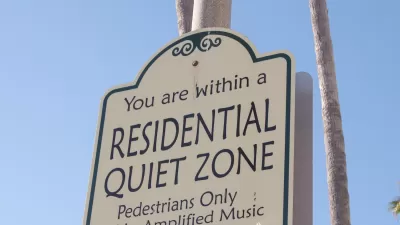It’s not just traffic collisions that kill—a new study from researcher at Rutgers finds that the loud noises emanating from cars has direct impact on heart health in Americans.

A recent study of New Jersey residents that finds car noise contributes to heart attacks, cardiovascular damage and higher rates of heart disease.
An article by Eve Kessler for Streetsblog USA shares news of the study, by researchers at Rutgers’s Robert Wood Johnson Medical School.
“The study used state data to look at almost 16,000 Garden State residents hospitalized for a heart attack in 2018. It found that the heart-attack rate was 72 percent higher in areas with a lot of transportation noise (cars, but also air traffic; Attention: Stop the Chop NYNJ), with fully 5 percent of hospitalizations for heart attacks traceable to elevated transportation noise,” writes Kessler.
“The ground-breaking study — which is among the first such efforts in the United States — aligns with several European studies and likely could be replicated in similarly dense, noisy urban areas.”
France is one of the few countries in the world with policies that work to curb excessive car noise. Earlier this year, French officials announced a plan to install “sound radars” to detect scofflaws. “According to a study by Bruitparif, a state-backed center that monitors noise in the Paris area, a modified scooter crossing Paris at night can wake as many as 10,000 people,” according to a New York Times article by Emma Bubola reporting the news in February 2022. Paris has banned most cars in an area of the city known as a zone apaisée, or quiet zone.
More details from the recent study, connected to the larger collection of findings on the ill effects of automobile dependency, are included in the source article below.
FULL STORY: THUNDER ROAD: Car Noise Stokes Heart Attacks, Study Finds

Maui's Vacation Rental Debate Turns Ugly
Verbal attacks, misinformation campaigns and fistfights plague a high-stakes debate to convert thousands of vacation rentals into long-term housing.

Planetizen Federal Action Tracker
A weekly monitor of how Trump’s orders and actions are impacting planners and planning in America.

San Francisco Suspends Traffic Calming Amidst Record Deaths
Citing “a challenging fiscal landscape,” the city will cease the program on the heels of 42 traffic deaths, including 24 pedestrians.

Defunct Pittsburgh Power Plant to Become Residential Tower
A decommissioned steam heat plant will be redeveloped into almost 100 affordable housing units.

Trump Prompts Restructuring of Transportation Research Board in “Unprecedented Overreach”
The TRB has eliminated more than half of its committees including those focused on climate, equity, and cities.

Amtrak Rolls Out New Orleans to Alabama “Mardi Gras” Train
The new service will operate morning and evening departures between Mobile and New Orleans.
Urban Design for Planners 1: Software Tools
This six-course series explores essential urban design concepts using open source software and equips planners with the tools they need to participate fully in the urban design process.
Planning for Universal Design
Learn the tools for implementing Universal Design in planning regulations.
Heyer Gruel & Associates PA
JM Goldson LLC
Custer County Colorado
City of Camden Redevelopment Agency
City of Astoria
Transportation Research & Education Center (TREC) at Portland State University
Jefferson Parish Government
Camden Redevelopment Agency
City of Claremont





























